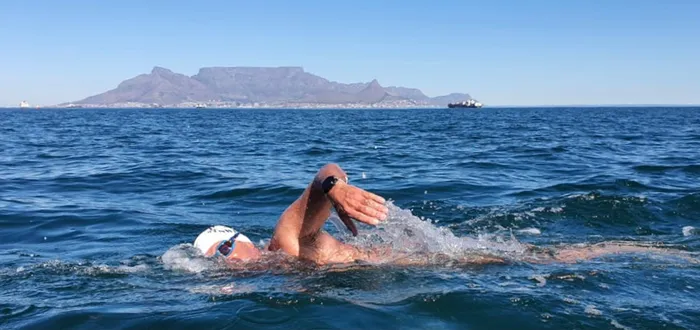Open-water swimmer’s mission to preserve marine life

Howard Warrington champions the plight of marine life. SUPPLIED
Cape Town - In an effort to highlight the plight of marine life, Howard Warrington is on the quest to reach his 100th crossing from Robben Island to Blouberg.
Having witnessed first-hand how pollution affects marine life, the endurance sport-obsessed Warrington will soon become the fourth person in the world to swim the 7.4km open water stretch 100 times through his initiative called, Swim4Survival.
While covering the distance can take anything from two hours to just over four hours, depending on swell, temperature, and ocean currents, Warrington is not allowing the crisp icy waters to stop him.
“As an open-water swimmer, I have witnessed first-hand the extent of the pollution, both on our beaches and far from our shores, and so, my wife, Elmarie, and I are making it our mission to act for animals whose habitats and lives are threatened by human action.
“There is no quick or merciful death for animals caught in ocean pollution. They suffer for days, unable to escape their plastic ’snares’ before succumbing. Those that ingest plastic, either accidentally or because they have mistaken it for food, die from starvation because they can't digest plastic, and it fools them into feeling full.”
“So, we have joined forces with the Cape of Good Hope SPCA because they have a wildlife unit that also witnesses the impact of ocean pollution every single day. This team has come to the rescue of seals, penguins, terrapin, cormorants, and even whales and dolphins. Elmarie and I want to ensure that they can continue to do their lifesaving work. Each rescue costs R450 on average, and we want to help them save as many animals as possible,” said Warrington.
With populates such as plastic bags, plastic bottles and glass bottles taking years to break down in the ocean, leaving approximately 1 000 000 sea birds killed by marine litter every year, wildlife inspector Jon Friedman said that the evidence is in the rescues they conduct.
“We’ve treated land birds like an Egyptian Goose with the gut so tightly wound around her legs that it was painfully restricting blood flow to her extremities and a Hadeda in the exact same predicament. Entanglement is common during nesting season when birds seek out material to build and line their nests.
“Marine mammals like Cape Fur Seals often get hooked on fishing hooks or entangled in packing tape and fishing line, which over time causes deep strangulating wounds. We’ve also treated a terrapin that swallowed a fishing line hook and all, but it sadly died as a result of its injuries,” said Friedman.
SPCA spokesperson Belinda Abraham said she hopes that this initiative will help highlight the diversity of Cape Town’s wildlife, make the community aware of the role they play with regard to monitoring and protecting these animals, and also address the issue of how ocean pollution has an impact on marine life.
“Howard is an incredible human being whose love for the open water extends to all living creatures who call it home. His respect for the environment and protecting natural habitats makes us proud to be associated with him. He is evidence that everyone can make a difference in the lives of animals if we live in a way that is considerate of all who share our world. When someone like Howard steps forward to act for animals, we can't help but feel encouraged and inspired. We are glad to call him a friend of ours and a friend to the animals.”
“We share our planet with wild animals and owe it to them to keep their habitat clean and safe. Recycle your plastic waste! These animals don’t have the ability to discern between a potentially harmful substance and food. To them, if it looks like food, smells like food or behaves like food – it’s food! In the ocean, filter-feeding animals can ingest plastic accidentally, while sunfish or turtles can mistake plastic bags for a jellyfish meal.
Scavengers like seagulls regularly consume plastic, which previously held human food. They are unable to digest plastic which means it remains in their gut, makes them feel full, and they essentially starve to death. And all of this suffering can be prevented by the responsible use of plastics and the responsible disposal of waste,” said Abraham.
Weekend Argus